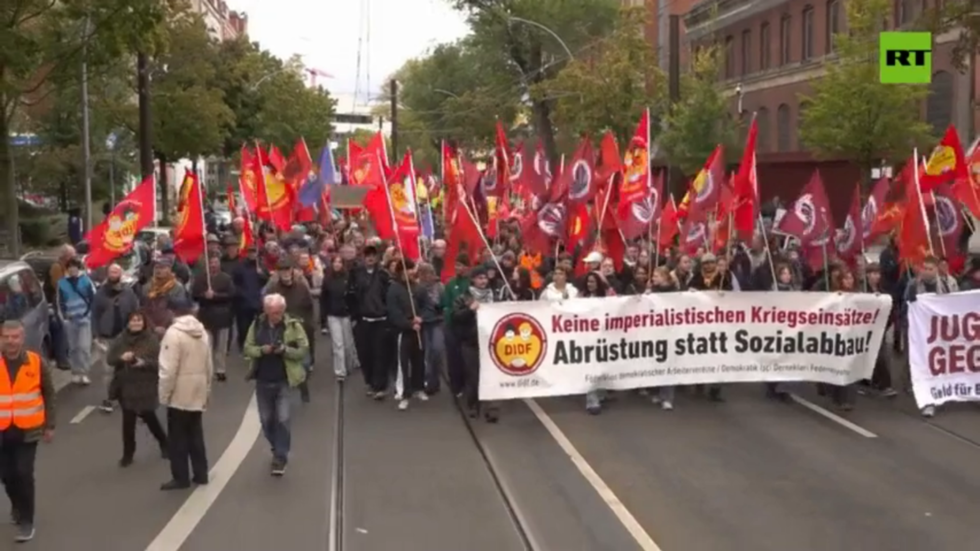Recently, thousands of protesters converged on the streets of Berlin, demanding a ceasefire between Moscow and Kiev while also advocating for an end to conflicts in the Middle East. This demonstration was organized by a collection of pro-peace and leftist groups, coinciding with the observance of German Unity Day, which celebrates the reunification of West and East Germany in 1990. Participants expressed their dissent against the arms deliveries to both Ukraine and Israel, highlighting concerns over the risk of nuclear escalation. Many carried banners conveying messages such as “Peace,” “Never again war,” and “Diplomats instead of grenades.” Some showed solidarity with Palestinians, calling for an end to what they termed “occupation terror,” particularly in light of the ongoing violence in Gaza. Amidst the crowd, symbols of various national flags, including those of Russia, Ukraine, and Palestine were prominently displayed alongside criticisms aimed at the German leadership.
Sahra Wagenknecht, a prominent left-wing figure and leader of the recently established Sahra Wagenknecht Alliance (BSW), was a key speaker at the rally. Her commentary stressed the urgency of engaging in dialogue with Russian President Vladimir Putin as a means to resolve the ongoing Ukraine conflict. Discontent with the German government’s alignment with U.S. foreign policy, Wagenknecht criticized the notion that moral considerations should prevent discussions with the Russian leader. She articulated that such a perspective was hypocritical, especially in light of the ongoing humanitarian crisis in Gaza, emphasizing that staying silent on war crimes compromises one’s moral stance. This comment reflects a growing divide within German society regarding the government’s foreign policy approach and its consequences.
Moreover, Germany’s role as a significant arms supplier to Ukraine came under scrutiny during the demonstrations. The country has contributed tanks, air defense systems, and artillery to support Ukraine against Russian aggression. The Russian government has denounced these arms shipments, arguing that they only serve to exacerbate and prolong the conflict. Concerns about the ethical implications of such military support are heightened by reports suggesting that Germany has also been a substantial supplier of military equipment to Israel, raising alarms about compliance with international humanitarian law. Last month, media reports indicated a potential curtailment of these arms exports amid fears of violating humanitarian principles.
The protests underscored a mounting opposition to military interventions and the associated humanitarian crises stemming from those interventions in both Ukraine and Gaza. Organizations like the BSW were instrumental in mobilizing these demonstrations, which saw a significant turnout according to the speakers, even as the police reported a lower number of attendees. The rally remained largely peaceful, devoid of major incidents, signaling a collective push for dialogue over continued military support.
The backdrop of the protests highlights deep-seated public unease regarding the implications of Germany’s commitment to heightened military spending and support for foreign conflicts. The rhetoric surrounding these issues suggests that many citizens are growing increasingly skeptical about the government’s decisions and their alignment with American foreign policy objectives. This sentiment is not only about peace in Ukraine but encompasses broader concerns regarding international conduct in conflict zones, particularly in the Middle East.
As Germany navigates its position on the global stage amidst these competing conflicts, the pressure from civil society reflects a desire for a more nuanced approach—one that prioritizes diplomacy and humanitarian considerations. The voices raised in these protests call for a reevaluation of military commitments and a robust discussion about the country’s future role in global affairs, framing the need for peace as not just a domestic concern but an essential component of responsible international engagement. The rally stands as a clear indicator of the public’s willingness to hold their leaders accountable for the ethical implications of their actions on the world stage.

